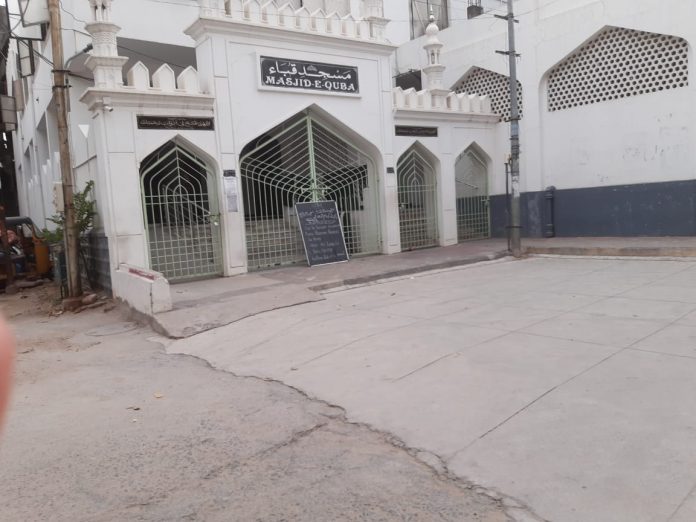Nikhat Fatima, Twocircles.net
Barring a handful of irresponsible people who for no valid reasons are out of their homes, the entire city of Hyderabad wears a deserted look. Even most places of worship in this heritage city are shut down following the lockdown order. The state, apart from ensuring that people stayed indoors has taken up the massive task of sanitizing public spaces, creating awareness through posters and advisories as well as setting up a ‘Corona Helpdesk’ in government-run hospitals. Chief minister K Chandrashekar Rao, while announcing the lockdown till April 14, went a step ahead in releasing a statement asking people to cooperate and stay indoors rather forcing the government to issue ‘shoot at sight orders.’
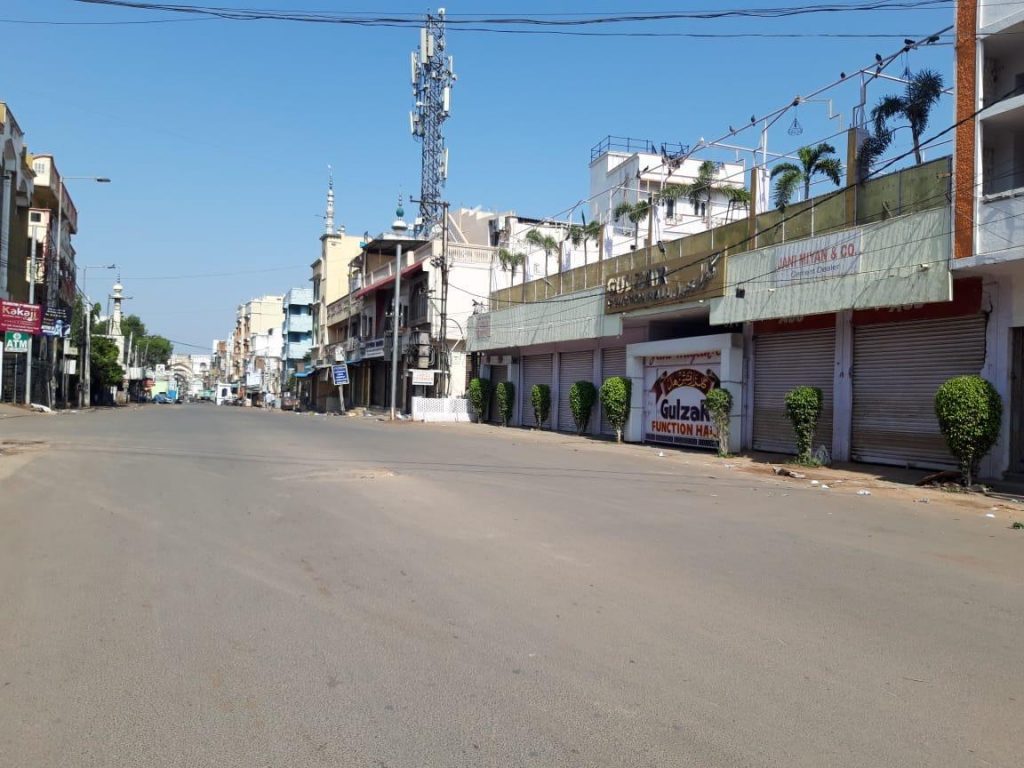
Despite the warnings, a total of 111 new cases were reported in last 24 hours in Telangana, according to data released by the Ministry of Health and Family Welfare, hence bringing the total reported cases of Coronavirus in Telengana to 269. Among the total people infected, 32 have recovered and 7 have passed away.
Soon after the lockdown was announced, several homeless people including daily wagers and migrant labourers were left in the lurch with no home, food, water and money. But from Day1 of the lockdown, local individuals have been organizing themselves into voluntary groups, along with charity organizations to step in to provide food for these people. In the beginning, Khalida Parveen, noted social activist of Hyderabad city began cooking food from her home and with a few girl volunteers went out amidst the curfew.
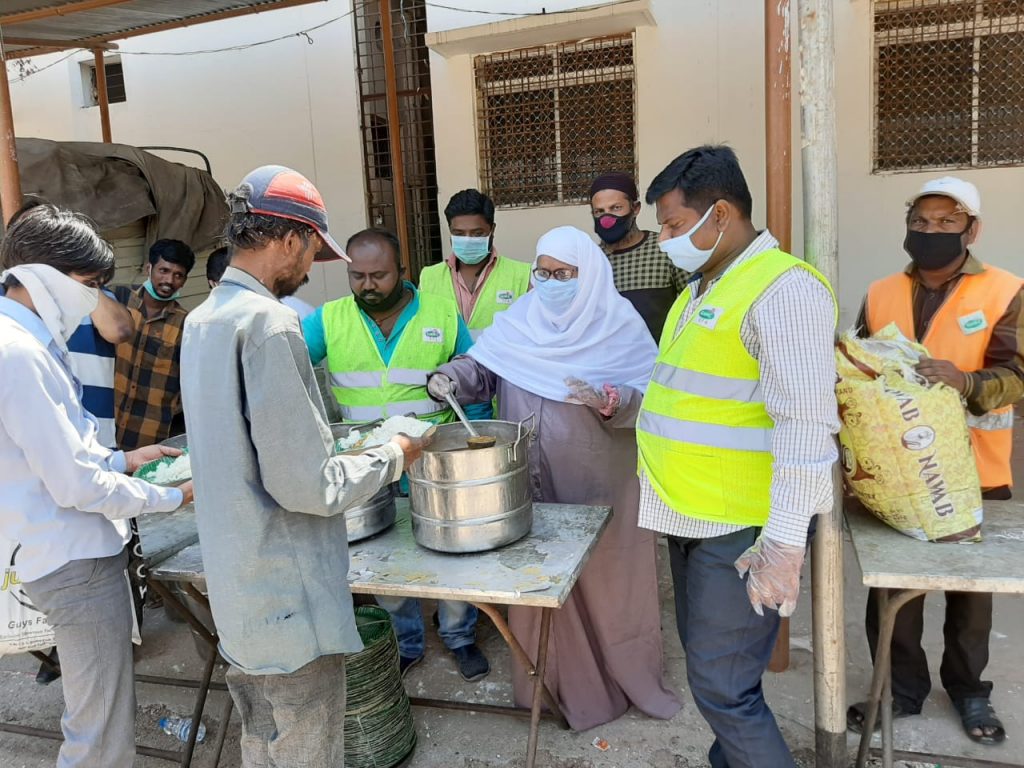
“We the protestors are protectors,” says Khalida Parveen, who had become the face of anti-NRC and anti-CAA protests in the city. She explained that initially it was not easy to venture out in curfews as there were policemen at every few meters who stopped them and had to be assured that they were out on a cause. Gradually, with more support from generous people, Khalida is now feeding about 200 people in more than 12 areas. Since she has a private vehicle she is also picking up food kits from donors and distributing them to people who have migrated for work from Assam, Bihar, Odisha, Chattisgarh and Jharkhand.
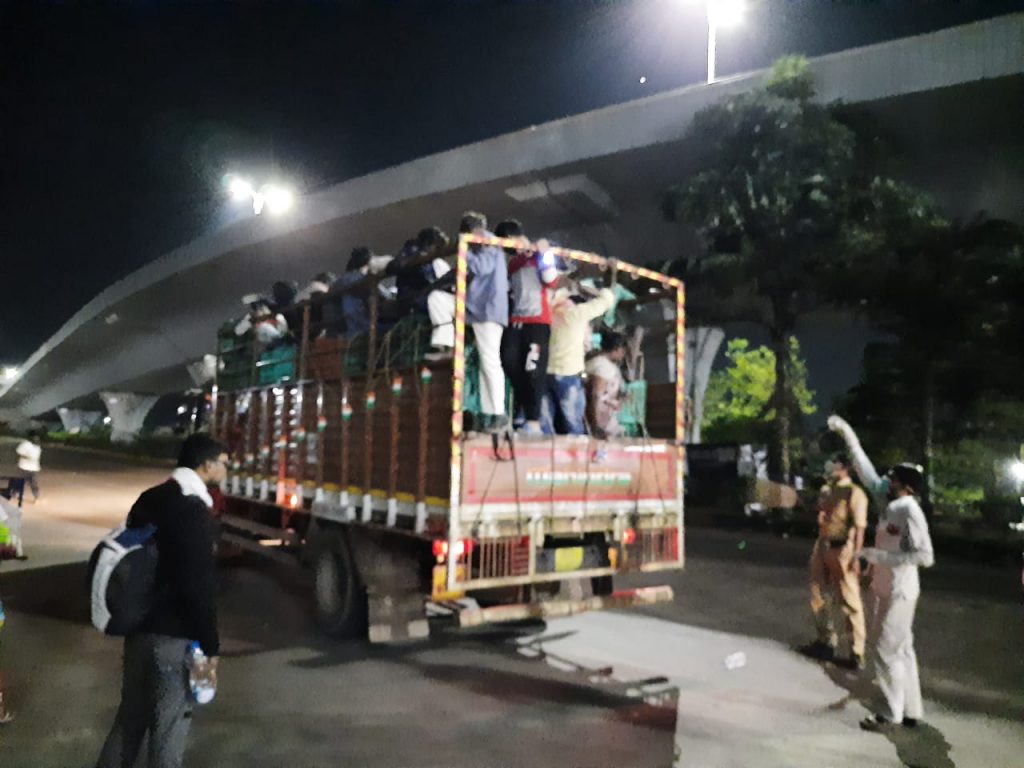
A high spirited Khalida opines that from the last 3 months they have been on the streets to protect the Indian Constitution and now once again they are on the streets to protect humanity. With visible pride on her face, she added, “We were lathi-charged, detained by the police and spent the whole night in police custody, cases were booked against us but we did not give up.” She said that similarly as they were at the frontline fighting fascism, they will again maintain being on the frontline to fight COVID-19.
While people distributed food, Maqbool Ahmed Mateen, President of United Citizens Forum, began distributing water to the needy. Along with his team, they began by arranging water for locals and those working in the hospitals as attendants. “We stop at each checkpoint and distribute water bottles to police, praising them for helping virus not spread through maintaining strict vigil on the movement of the public” said Mateen, discussing that in the beginning there were many problems in movement. Communicating with the police reminding them how difficult life has become for the poor is one solution adopted by his team that has made things easier, he feels.
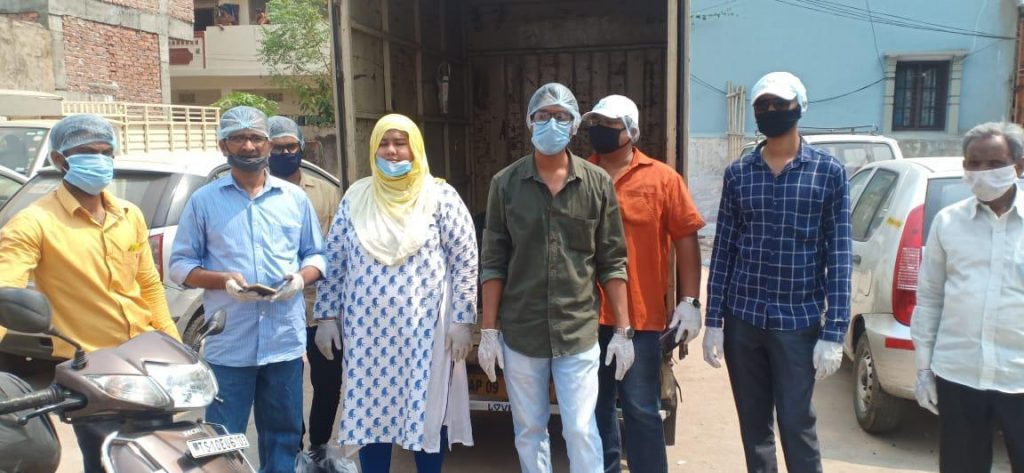
Mateen’s team goes to hospitals and also distributes food packets, water bottles, biscuits. The same is made available to people sleeping on roadsides. He informed that now they get calls from many people who donate bread loaves, water bottles, uncooked rice and dal and his team is responsible for picking these up from the respective locations.
“They thought because Muslims are distributing it will be non-veg food and so refused,” shared Shiba Minai, one of Mateen’s teammates and part of the United Citizens Forum. She discussed that some beneficiaries who were gatekeepers and caretakers of a mandir were reluctant to receive food from Muslims. One of them, Shiba said, wanted the food badly and gestured so. When she went near, the beneficiary asked whether the food was cooked in the same vessel as beef.

Instead of being annoyed she and the other volunteers burst out laughing at the stereotypes people have about the others. “Without wanting to sound like a hopeless romantic, I truly believe Humanity today is winning,” said Shiba. They explained that the volunteers are checked at 15 different check points by the police and all this trouble is borne by them only because they want to help their fellow humans.
Other than food and water, many organizations are also collecting donations of kind and cash to distribute essentials for free. A group of women activists, by pooling in money together, are distributing gloves and masks to garbage collectors and sanitization workers.
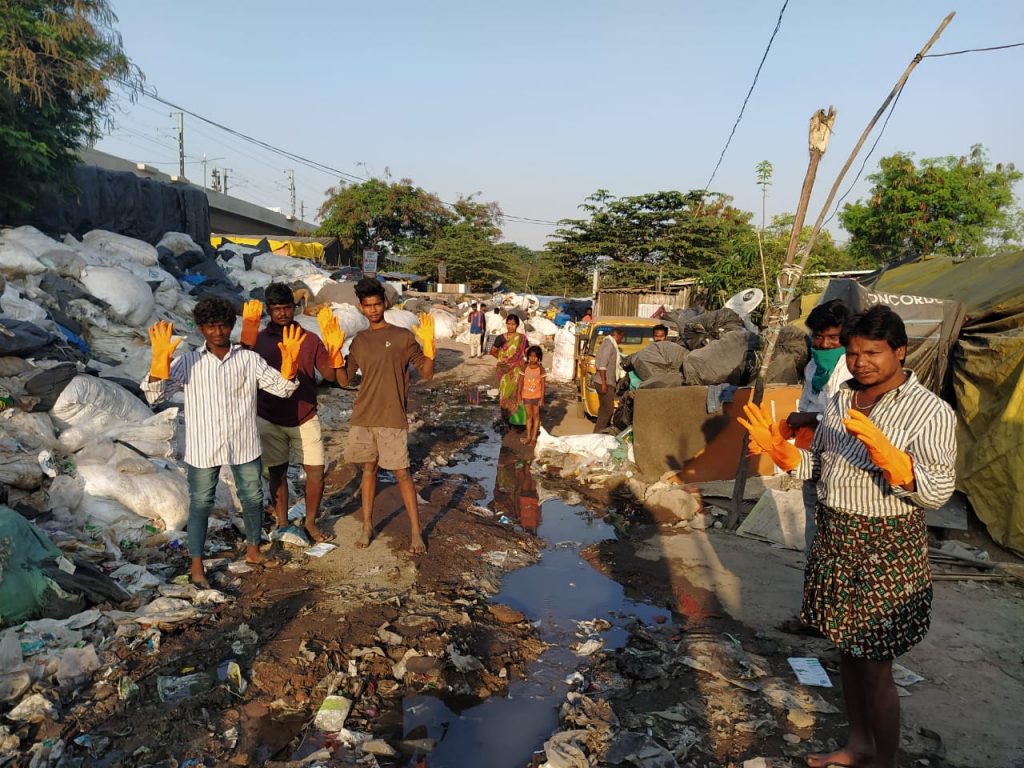
Getting the State to Act
Some activists had been writing to Greater Hyderabad Municipal Corporation (GHMC) for reopening ‘Annapurna Canteens’ which had been discontinued due to the lockdown. GHMC runs these canteens where rice and dal are served for just Rs 5.
GHMC has, after these requests, started some of the canteens and is now providing free lunch and supper. However, due to strict lockdown orders, canteens at several locations are still not functioning thus leaving out many poor slum dwellers unable to avail the scheme. But these voluntary channels of individuals and organizations are bridging the gap by reaching out to workers in remote areas by distributing cooked food and monthly rations to their families. Some of these organizations are the Lions Club, Freemasons, Sakina foundation, R.R Charitable trust, and more.
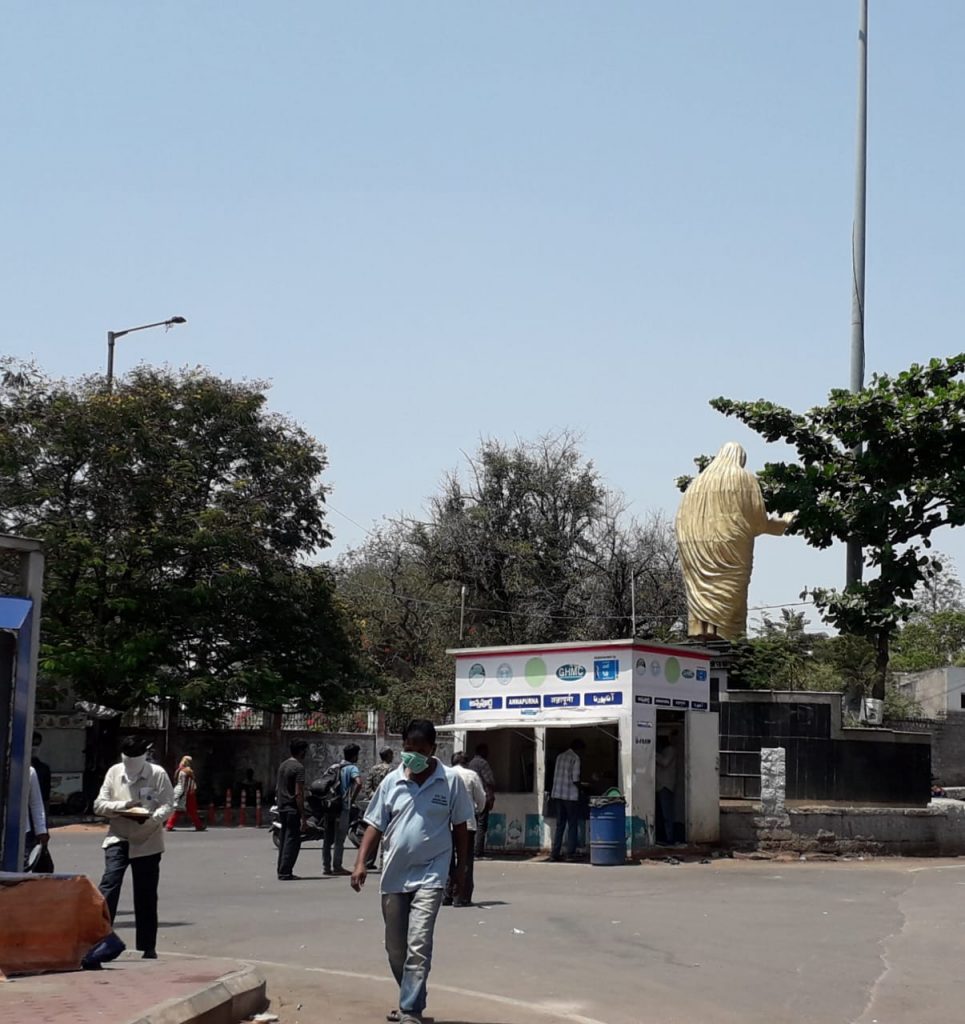
Kalaam Foundation, Helping Hand humanity, Seva Bharti, Sahayata Trust are pitching in together to reach out to people living in more than 1400 slums and others who have come for work from different states and have nowhere to go.
Individuals like Azhar Maqsosi who used to feed hundreds of people even before the lockdown, continues doing so even now; Syed Kazim Ali Hashmi of SKAH group is distributing cooked food to nearly 3000 people every day in Aramgarh and surrounding communities.
Mohammed Shujatullah who is running ‘Humanity First Foundation’, serves breakfast to 1000 people who are patients or attendants at 3 government hospitals of Hyderabad daily. On the Janata curfew day, Shujat could not go to hospitals while people were waiting for him to turn up. And the doctors themselves called him up informing him that people were waiting for him. After great negotiation, Shujat requested the police to allow him to go. He is now providing lunch as well.
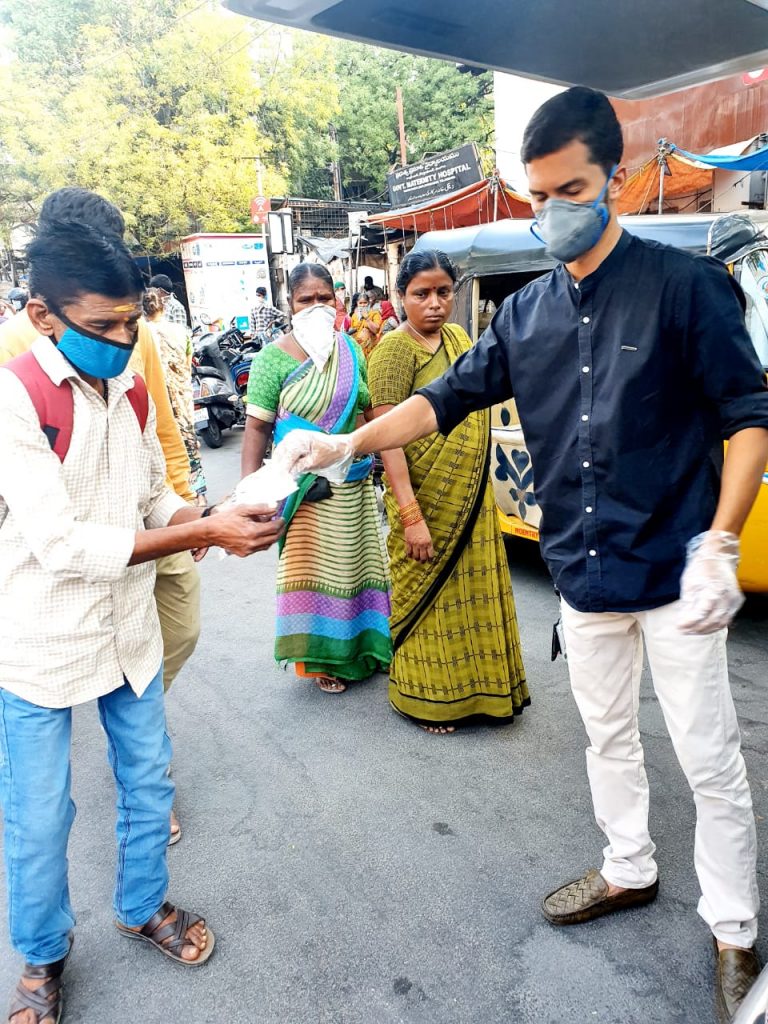
The Gurudwarasaheb at Secunderabad is running langar for migrant labourers other than distributing rations to the needy.
Following the upsurge in goodwill gestures of good Samaritans, Chief Minister Rao has also announced 12 kilos of rice to all BPL families and Rs. 1500, a one-time payment. But again, all shops under Public Distribution Scheme (PDS) aren’t open. The few that are supplying free rice have long queues of women. “Many of us came back empty-handed. We have to try tomorrow,” said Maimuna.
Maimuna is one of the women who had queued up at the PDS shop in her locality from morning 6 AM. She shared that even though she was at the shop since 6, there were more people who had come in since 4 in the morning. A visibly sad Maimuna said that when the shop finally opened at 9 AM, only 30 people in total received free rice.
Although the police is helping groups distribute rations by ensuring it reaches the needy, it has to do so without any visible thronging of people to grab the available food. And this has become even tougher with fewer Annapurna canteens and limited supply of rice. Citizens who are relentlessly working to help the needy are also are bearing the brunt from police and security forces. The police, apart from restricting people roaming unnecessarily are sometimes beating them up.
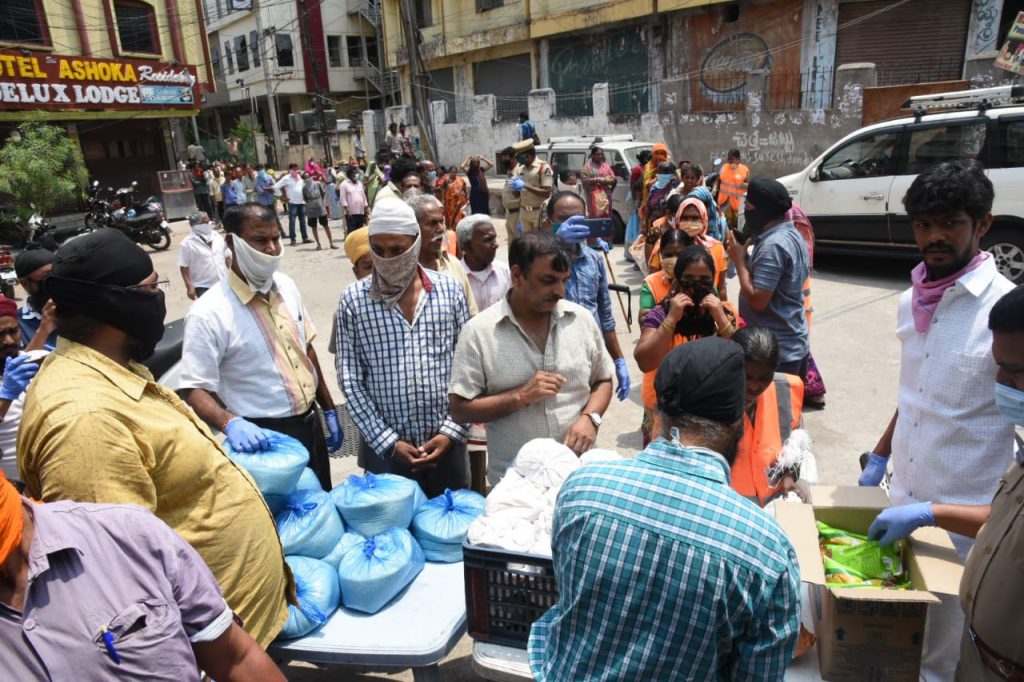
Not just food, but other necessities also are taken care of
Apart from food, gloves and masks, in the city of Hyderabad, other forms of help are also being provided by the locals. Nuns from St. Francis College in Begumpet and St. Francis Convent in Secunderabad donated mattress, bed sheets, towels, soaps, saris, pants and shirts, nighties, Churidars, skirts, powder, oil, and chappals.
Some counselling centres are also offering free counselling to family members and relatives of those affected by Coronavirus.
In a very different turn of events, people of Hyderabad are also enabling people to go back to their natives. Vegetable sellers who come to the city from surrounding suburbs were stranded just like the migrant laborers. Some were helped to go back to their villages that were not too far. Others from far off places were assured that they would be provided with food.
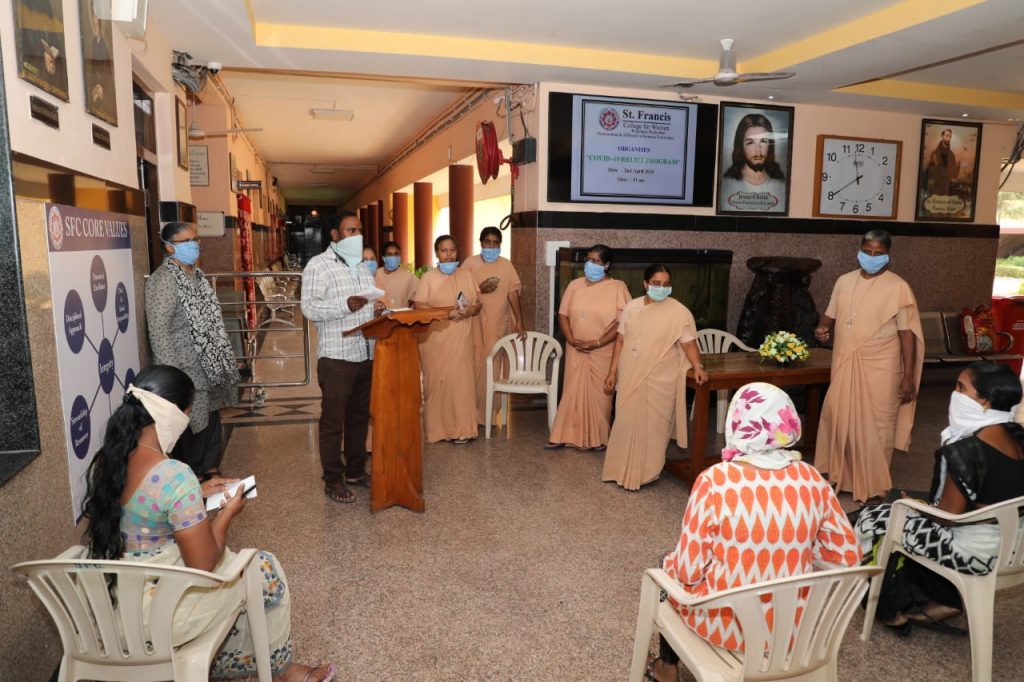
Students who had nowhere to go as colleges, universities and hostels have been shut down have been helped to go back to their homes to different states with donations from generous people.
A 9-year-old girl, Zaina, had come to spend vacations with her an aunt started feeling homesick once the lockdown started. Her aunt then sent out an SOS to the police, following which many activists helped send the girl back to her home in Gulbarga, Karnataka. Shiba Minai, who has been active during anti-CAA protests, managed to contact the Zaina’s parents in Gulbarga and drove the girl to the border of the state where she was confronted by police security and barricades on both sides.
“It was a matter of just crossing barricade 1 of Telangana and barricade 2 of Karnataka,” recalled Shiba. The police wouldn’t allow the little girl to cross the barricades even though her uncle was there waiting at the other end despite several requests and personal assurances. After a while, one policeman turned his back and taking the cue, Shiba asked Zaina to run across to her uncle.
It is indeed a silver lining that as the country battles the Novel Coronavirus, such brilliant stories of human compassion are flooding news and social media across the country.


